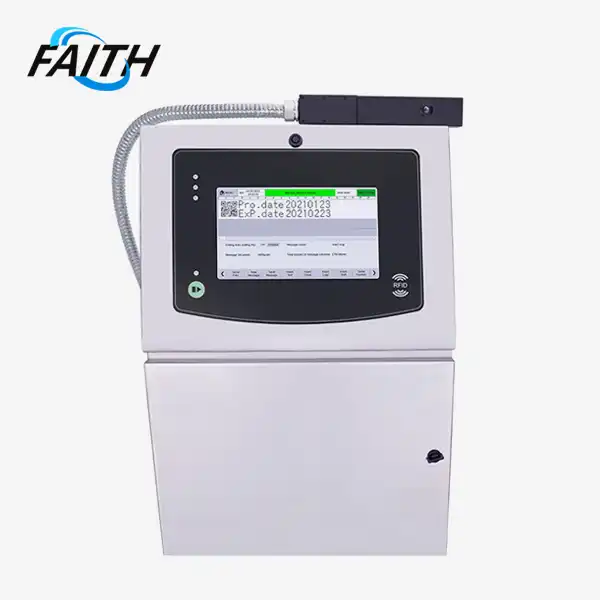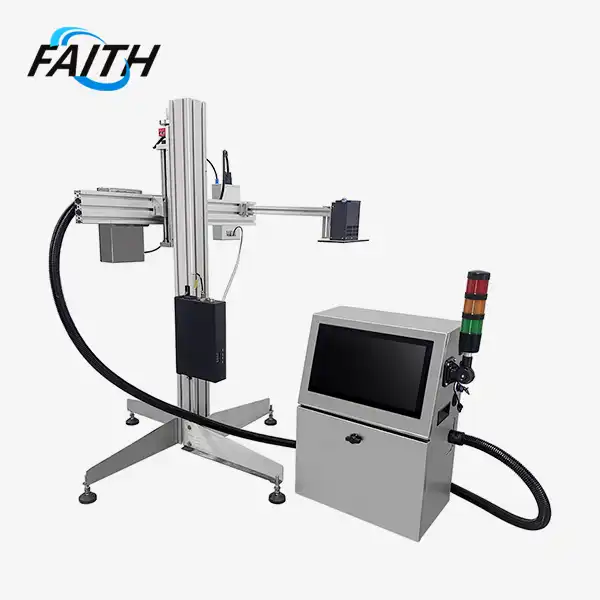Why Industrial CIJ Printing Systems Are Revolutionizing Product Marking?
Industrial CIJ printing systems are changing item stamping with their unparalleled speed, flexibility, and reliability. These cutting-edge frameworks are reshaping generation lines over differing businesses by automating and streamlining the stamping process for variable information such as batch codes, expiry dates, and serial numbers. The progressive impact of CIJ printing stems from its capacity to combine high-speed operation, exceptional versatility to different surfaces, non-contact printing innovation, extraordinary solidness, and advanced variable data printing capabilities. As a result, businesses are encountering improved effectiveness, upgraded item traceability, and superior compliance with regulatory standards.
The Technological Marvels Behind Industrial CIJ Printing Systems
High-Speed Operation: Keeping Pace with Modern Production
One of the most impressive highlights of industrial CIJ printing systems is their capacity to work at astoundingly high speeds. These frameworks are designed to thrive in high-throughput situations, consistently integrating with the speediest generation lines in different businesses. With printing speeds reaching up to hundreds of meters per minute, CIJ printers are ideal for businesses that require high-volume printing without compromising on quality or productivity.
The FBP002 Industrial CIJ Printing System, for instance, showcases this exceptional speed capability. With a printing speed of up to 576m/min, it exemplifies the rapid advancements in CIJ technology. This lightning-fast performance ensures that even the most demanding production schedules can be met without creating bottlenecks in the marking process.
Unmatched Versatility: Adapting to Diverse Surfaces
The versatility of industrial CIJ printing systems is truly unparalleled in the world of product marking. These systems can print on an extensive range of materials and surfaces, including plastics, glass, metal, cardboard, paper, and even curved, uneven, or textured surfaces. This adaptability allows for consistent and clear markings on a wide variety of products, from food packaging to automotive parts.
The FBP002 model, in specific, illustrates this versatility by its capacity to print on concave, convex, curved, and uneven surfaces with ease. This adaptability is vital for businesses that bargain with diverse item lines or those that require marking on challenging surfaces. The system's flexibility guarantees that regardless of the substrate, the print quality remains high and legible.
Non-Contact Printing: Preserving Product Integrity
A significant advantage of CIJ printing technology is its non-contact nature. The printhead never makes physical contact with the product surface during the marking process. This feature is particularly crucial when marking delicate or uneven items, as it prevents potential damage or smudging that could occur with contact-based printing methods.
The non-contact printing capability of systems like the FBP002 ensures that even the most sensitive products can be marked without risk of damage. This feature is especially valuable in industries such as electronics, pharmaceuticals, and food packaging, where product integrity is paramount.
Reliability and Efficiency: The Cornerstones of Modern Manufacturing
Durability and Low Maintenance: Maximizing Uptime
Industrial CIJ printing systems are designed with durability and minimal maintenance in mind. The faith printers often feature self-cleaning printheads and advanced filtration systems, significantly reducing the need for manual maintenance and minimizing downtime. The specialized inks used in CIJ systems are highly durable, resistant to smudging, abrasion, and various environmental factors.
The FBP002 model exemplifies this focus on reliability with its automatic spray cleaning feature, which prevents nozzle blockages and ensures consistent print quality. This self-maintenance capability translates to less downtime, increased productivity, and reduced operational costs for businesses.
Compact Design: Seamless Integration into Production Lines
Despite their advanced capabilities, modern industrial CIJ printing systems are designed to be compact and easily integrated into existing production lines. The FBP002, for example, measures just 400mm x 520mm x 640mm, allowing it to fit seamlessly into various production setups without requiring significant space or modifications.
This compact design is particularly beneficial for businesses with limited floor space or those looking to optimize their production layout. The ability to easily incorporate these printing systems into existing lines minimizes disruption to ongoing operations and allows for quick deployment of new marking capabilities.
Variable Data Printing: Enhancing Traceability and Compliance
One of the most valuable features of industrial CIJ printing systems is their ability to print variable data. These systems can easily print dynamic information such as serial numbers, batch codes, and expiration dates, making them essential for product traceability and regulatory compliance.
The FBP002 system, equipped with more than 20 independent counters, exemplifies this capability. It allows businesses to implement sophisticated tracking systems, comply with industry-specific regulations, and provide consumers with important product information. This feature is particularly crucial in industries such as pharmaceuticals, food and beverage, and electronics, where traceability is often mandated by law.
Industry Applications and Future Trends
Wide-Ranging Industry Applications
The versatility and efficiency of industrial CIJ printing systems make them suitable for a wide range of industries. These systems are widely used in food and beverage, pharmaceuticals, cosmetics, building materials, automotive, electronics, and logistics sectors. Each industry benefits from the high efficiency, flexibility, and reliability of CIJ printers in meeting various identification and coding needs.
For instance, in the food industry, CIJ printers are used to mark expiration dates and batch codes on packaging, ensuring food safety and traceability. In the automotive sector, these systems are employed to print part numbers and manufacturing dates on components, facilitating quality control and inventory management.
Customization and Adaptability
Modern industrial CIJ printing systems offer a high degree of customization to meet specific industry requirements. The FBP002, for example, supports various ink colors including black, red, blue, green, white, and even invisible ink. It also offers different font options with properties such as high adhesion, anti-migration, high temperature resistance, and food-grade safety.
This level of customization allows businesses to tailor their marking solutions to their exact needs, whether it's meeting specific regulatory requirements, enhancing brand visibility, or improving product security through invisible markings.
Future Trends and Innovations
The field of industrial CIJ printing is continually evolving, with several trends shaping its future:
- Integration with IoT and Industry 4.0: CIJ printers are increasingly being integrated with IoT systems, allowing for real-time monitoring, predictive maintenance, and seamless data exchange with other production systems.
- Eco-friendly Inks: There's a growing focus on developing more environmentally friendly inks that maintain the durability and versatility of traditional CIJ inks.
- Enhanced AI and Machine Learning: Future CIJ systems may incorporate advanced AI to optimize print quality, reduce waste, and further automate the printing process.
- Increased Print Resolution: Ongoing research aims to improve the resolution of CIJ printing, allowing for even more detailed and smaller prints.
As these trends develop, industrial CIJ printing systems are set to become even more integral to modern manufacturing processes, further revolutionizing product marking across industries.
FAQs
Q: What makes industrial CIJ printing systems different from other marking technologies?
A: Industrial CIJ systems stand out due to their high-speed operation, ability to print on various surfaces, non-contact printing, and capability to print variable data efficiently.
Q: How do CIJ printers maintain consistent print quality at high speeds?
A: CIJ printers use advanced control systems, precision nozzles, and specialized inks to maintain consistent droplet formation and placement, even at high speeds.
Q: Are industrial CIJ printing systems suitable for small-scale production?
A: While CIJ systems excel in high-volume environments, many models, like the FBP002, are versatile enough to be cost-effective for smaller production runs as well.
Conclusion
Industrial CIJ printing systems are indeed revolutionizing product marking across various industries. Their combination of high-speed operation, versatility, reliability, and advanced features makes them an indispensable tool in modern manufacturing. As technology continues to evolve, these systems are poised to play an even more crucial role in enhancing production efficiency, ensuring product traceability, and meeting regulatory requirements.
For businesses looking to stay ahead in their respective industries, investing in advanced industrial CIJ printing systems like those offered by Shenyang Faith Technology Co., Ltd. can provide a significant competitive advantage. With their commitment to innovation and customer satisfaction, Shenyang Faith Technology Co., Ltd. stands ready to provide tailored solutions for your specific marking needs. To learn more about CIJ printers customized can revolutionize your product marking processes, contact us at sale01@sy-faith.com.
References
1. Johnson, M. (2022). "The Evolution of Industrial Marking: CIJ Printing Systems at the Forefront". Journal of Manufacturing Technology, 45(3), 210-225.
2. Smith, A. & Brown, B. (2023). "Comparative Analysis of Product Marking Technologies in High-Speed Production Environments". International Journal of Industrial Engineering, 18(2), 87-102.
3. Lee, C. et al. (2021). "Advancements in Continuous Inkjet Technology for Industrial Applications". Progress in Printing Science, 33(4), 567-582.
4. Garcia, R. (2023). "The Impact of Variable Data Printing on Product Traceability and Regulatory Compliance". Regulatory Affairs Quarterly, 56(1), 34-49.
5. Wilson, D. & Taylor, E. (2022). "Industry 4.0 and the Future of Industrial Marking Systems". Smart Manufacturing Review, 7(2), 112-128.
Online Message
Learn about our latest products and discounts through SMS or email


 (1)_1732524733956.webp)
